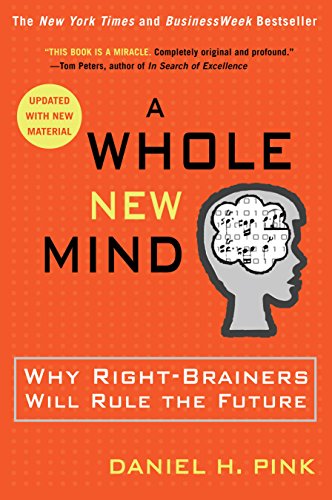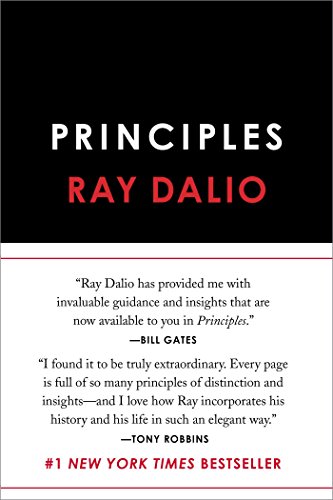A completely different kind of man with a very different kind of mind will dominate the future Left brain hegemony and the digital age it gave rise to, are now opening the path to a modern environment in which right brain qualities (creativity, emotion, intuition) predominate. That’s the premise at the heart of this insightful and groundbreaking novel that uses the two sides of our minds as a analogy to explain the contours of our times. Daniel H. Pink provides a new glimpse at what it takes to excel in the tradition of Emotional intelligence and Now, Find Your Strengths. A Whole New Mind outlines the six vital qualities that now rely on career achievement and personal satisfaction, and provides a series of hands-on drills taught by professionals around the world to help readers sharpen the expertise they need. The book does not only change how we view the world, but also how we perceive it.
Highly reviewed decision making books
Lexinum helps you find books to improve your life. We analyse user reviews and select for you highly reviewed books in decision making and other topics.
Timing, which is sometimes taken for granted, is an art. In When: The Scientific Secrets of Perfect Timing, Pink reveals that timing is truly a science. Building on a variety of studies, Pink explores the ideal way to live, work, and prosper. How could do we create the perfect routine using the invisible patterns of the day? In When, Pink distills state-of-the-art science and information on timing and synthesizes them into a informative, concise story filled with enticing tales and realistic takeaways that offer readers insightful perspectives into how they can live more engaged, happier lives.
How to make good choices and accomplish your goals? What influences and determines a person’s work and life as a leader? Managing it all is hard, and leading in our hyper-paced society is even harder.
Leadership expert Steve McClatchy demonstrates it can way easier than you think. In Decide, McClatchy, who partners with Fortune 1000 leaders every day to help them reach excellent performance, teaches you how to break through the distractions and begin making improvements by just adapting one thing: how to make choices. McClatchy has helped individuals discover how proper decision-making habits produce a lifetime of achievements. Follow McClatchys no-nonsense and realistic strategy, and quickly you can handle and even lead your professional success at the highest level.
Big, life-changing choices are so much more important than the decisions that we make every day, and they are often the most difficult: where to live, who to marry, what to believe, how to begin a business… To solve these kinds of conundrums, there is no one-size-fits-all solution. While you cannot template a once-in-a-lifetime option, you can influence the professional decision-makers’ deliberative strategies. These professionals are not just the master strategists who manage big business and discuss negotiations at the highest level. They are the novelists who evoke the complexities of the internal life of their protagonists, the city authorities who ensure long-term sources of food, and the researchers who encounter potential problems that many of us have never yet considered. The smartest decision-makers don’t rely on instinct solely. Their success is built on a forward-looking attitude and the desire to look at all their choices in a innovative, constructive manner. Through engaging narratives that share unexpected insights, Johnson describes how we can make decisions that will more effectively shape the course of a life, an organisation, or a society. Farsighted will allow you to envision the life and understand the implicit wisdom of the decisions that influenced our larger cultural past.
Real freedom is to live your life the way you want it. In this book you will learn that you can actually enjoy your liberty without changing anything in your envirnomment being people or things…
Poker player and business strategist Annie Duke shows you how to be confident with doubt and insecurity and ultimately make better choices. In Super Bowl XLIX, Seahawks coach Pete Carroll made one of the most controversial decisions in NFL history: he opted for a passed that was intercepted bringing his team to defeat. Did Carroll had a good plan that’s been spoiled by poor luck or his call was just plan stupid ? Point is the right decision does not necessarily yield the perfect outcome. Theres is also an aspect of chance that you can’t manage, and information out of your reach. The trick to long-term sustainability is to think like a poker professional player, before each bet you must consider the odds. Which move has the highest probability of success? Annie Duke, a former World Series of Poker champion who is now a business strategist delivers advices on accepting randomness and making decisions to the best of your knowledge. It’s tough for many people to admit that nothing is certain in a society promoting the illusion of certitude. Yet experienced poker players are familiar with the fact that good decisions do not always lead to fantastic results and poor choices do not always end in bad outcomes. You can be less vulnerable to impulsive reactions or biased assumptions in your decision-making by changing your perspective.
A groundbreaking study of how computer machine knowledge can be extended to our everyday lives, helping solve specific decision-making challenges and highlighting the workings of the human brain. The lack of pace and time usually constrains our life, those constraints give rise to a large set of problems. Those may sound like purely human dilemmas, but they aren’t: algorithms often face the same limitations, and computer scientists have been dealing for decades with their interpretation of these problems. So they’ve found approaches that have a lot to tell us. Acclaimed writer Brian Christian and cognitive scientist Tom Griffiths demonstrate in a dazzlingly interdisciplinary study that computer-used algorithms could often untangle very human problems. Algorithms to Live By turns the wisdom of computer science into techniques for human life, from choosing a partner to locating a parking spot, from arranging one’s mailbox to learning how memory works.
It’s not a book about enhancing conversations, speeches, and ideas; it’s about taking the blah-blah-blah out of your life for ever.
Most likely ou assume that your decisions and actions are guided by your individual, private interests and preferences. You have selected a certain profession because it is appealing for you. The idea that our own views and beliefs guide our decisions is globally accepted. Certain people’s actions have a significant effect on what we do at any moment of our lives, without us realizing it. Jonah Berger incorporates analysis and thought from psychology, and social science in Invisible Influence to reflect on the hidden, unseen forces behind our personal choices. We will determine when to oppose and when to accept it by knowing how external influence works.
Ray Dalio, one of the most influential businessmen and entrepreneurs in the world, shares the unorthodox ideas he has created, perfected and used over the past 40 years to produce remarkable outcomes in life and industry. in 1975, from his two-bedroom apartment in New York City, Ray Dalio formed an investment company, Bridgewater Associates. Forty years on, according to Fortune Magazine, Bridgewater has made more money for its investors than any other hedge fund in history and has developed into the second largest investment firm in the U.S. Dalio was added to the list of the 100 most influential men in the world by Time magazine. Dalio shares what he has learned during his incredible career in Principles. Hundreds of concrete insights from the book, built on its cornerstones of revolutionary honesty and radical openness, include Dalio pointing out the most successful strategies for people and organisations to take decisions, tackle problems, and create powerful teams. He also presents creative methods to bring a meritocracy philosophy to life, such as developing baseball cards for all workers distilling their abilities and shortcomings, or using computer-based decision-making processes to create credibility-weighted decisions. Although the book brims with innovative concepts for organisations and agencies, Principles also offers a simple, concise guide to decision-making which Dalio thinks everyone should follow, regardless of what they try to do.









